Living with and beyond cancer: The improvement story so far - NHS ...
Living with and beyond cancer: The improvement story so far - NHS ...
Living with and beyond cancer: The improvement story so far - NHS ...
Create successful ePaper yourself
Turn your PDF publications into a flip-book with our unique Google optimized e-Paper software.
38 | <strong>Living</strong> <strong>with</strong> <strong>and</strong> <strong>beyond</strong> <strong>cancer</strong>: <strong>The</strong> <strong>improvement</strong> <strong>story</strong> <strong>so</strong> <strong>far</strong><br />
Mount Vernon Cancer Centre<br />
Identifying the potential to reduce hospital follow ups<br />
Summary<br />
<strong>The</strong> Mount Vernon Hospital head <strong>and</strong><br />
neck team run a weekly combined ‘one<br />
stop’ clinic where patients can meet<br />
<strong>with</strong> a range of health professionals at<br />
one appointment rather than returning<br />
to hospital several times. At the clinic,<br />
they can meet <strong>with</strong> their surgeon,<br />
oncologist, <strong>cancer</strong> nurse specialist,<br />
speech <strong>and</strong> language therapist (SALT)<br />
<strong>and</strong> dietician.<br />
<strong>The</strong> problem<br />
With the increasing dem<strong>and</strong> on<br />
capacity we wanted to identify if there<br />
was a particular group (<strong>and</strong> if <strong>so</strong> what<br />
percentage) of patients who could be<br />
discharged to their GP instead of<br />
continuing <strong>with</strong> follow up<br />
appointments at the <strong>cancer</strong> centre.<br />
What was done<br />
During December 2009 <strong>and</strong> January<br />
2010, doctors at the weekly combined<br />
head <strong>and</strong> neck clinic were given an<br />
audit form to complete when they met<br />
<strong>with</strong> their patients. This form asked for<br />
data re: patients diagnosis, type of<br />
treatment received, year treatment<br />
completed <strong>and</strong> if the doctor felt the<br />
patient was suitable to be discharged<br />
to their GP <strong>with</strong> appropriate support,<br />
information <strong>and</strong> fast access back into<br />
the combined clinic if requested. <strong>The</strong><br />
form al<strong>so</strong> asked if the patient had been<br />
given a future follow up appointment<br />
at the combined clinic, <strong>and</strong> if <strong>so</strong>, when<br />
<strong>and</strong> why was this Was it for for<br />
surveillance, investigation, morbidities,<br />
reassurance, needs to see SALT or<br />
dietician or other (e.g. protocol /<br />
routine). <strong>The</strong> form al<strong>so</strong> asked if the<br />
patient relapsed, was there still a<br />
‘salvage’ treatment option available.<br />
What difference has the testing<br />
work made or identified<br />
<strong>The</strong> audit has shown that there is a<br />
particular group of patients who, <strong>with</strong><br />
the correct information <strong>and</strong> appropriate<br />
support could be discharged much<br />
<strong>so</strong>oner than they would under the<br />
current protocol. <strong>The</strong> patients identified<br />
for discharge to GP all appear to have<br />
<strong>cancer</strong>s of the oropharynx (i.e. front of<br />
the mouth) <strong>so</strong> it is not necessary to<br />
review the larynx <strong>with</strong> a scope to detect<br />
recurrence.<br />
A total of 92 (usable) forms were<br />
completed that could be analysed. Of<br />
these, 25 (27%) said that the patient<br />
was suitable to be discharged to their<br />
GP. 14 of these 25 patients had<br />
completed their <strong>cancer</strong> treatment<br />
between 2007 – 2009. If they were to<br />
be discharged now to their GPs, it<br />
would be considerably <strong>so</strong>oner than the<br />
current protocol of five years post<br />
treatment hospital follow up<br />
appointments for head <strong>and</strong> neck<br />
<strong>cancer</strong> patients.<br />
Learning <strong>so</strong> <strong>far</strong><br />
<strong>The</strong> whole audit process was more time<br />
consuming than we first thought it<br />
would be. All the doctors in clinic were<br />
positive about <strong>and</strong> willing to participate<br />
in the audit. However, it is an extremely<br />
busy clinic <strong>and</strong> it was quite a challenge<br />
to get as many forms as possible<br />
completed.<br />
Things that would have helped the<br />
audit were:<br />
• To have had a clinic list of patients<br />
beforeh<strong>and</strong> to complete the basic<br />
data for each audit form <strong>and</strong> insert at<br />
the appropriate place in case notes<br />
for completion<br />
• Include more tick boxes to avoid<br />
issues <strong>with</strong> h<strong>and</strong>writing <strong>and</strong> the need<br />
to relook at case notes to fill in gaps<br />
that were not completed by the<br />
doctors<br />
• To include on the audit whether, if<br />
follow up is required, this should be<br />
by surgeon or oncologist or both.<br />
Next steps<br />
To date the findings from this audit<br />
have been presented to the two<br />
oncologists for the combined head &<br />
neck clinic. <strong>The</strong>y will be presented to a<br />
wider audience when an opportunity<br />
arises.<br />
To implement the study findings one<br />
suggestion is for all patients to have a<br />
review after two years of follow up.<br />
A decision could then be made to<br />
discharge selected patients early after a<br />
number of factors had been considered<br />
including tumour site <strong>and</strong> difficulty of<br />
surveillance, ongoing morbidity,<br />
compliance <strong>with</strong> follow up<br />
appointments during the preceding<br />
two years <strong>and</strong> continued smoking or<br />
drinking.<br />
Contact<br />
Teresa Young<br />
teresa.young2@nhs.net



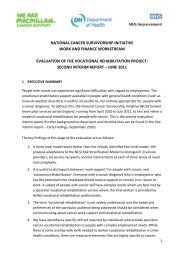
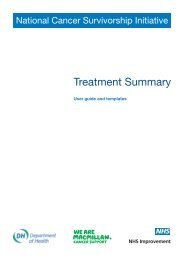
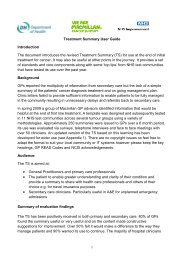
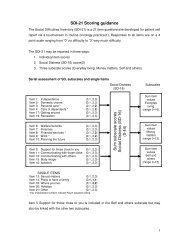
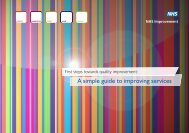
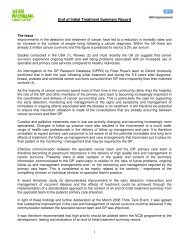
![Download the how to guide [PDF] - Macmillan Cancer Support](https://img.yumpu.com/47067428/1/184x260/download-the-how-to-guide-pdf-macmillan-cancer-support.jpg?quality=85)
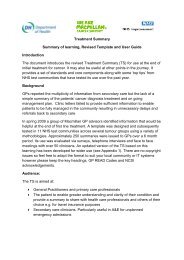

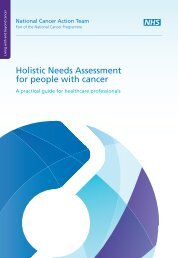
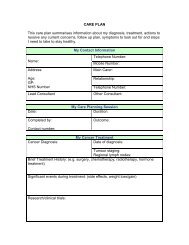

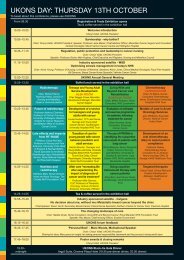
![HOPE Protocol [PDF, 420KB] - National Cancer Survivorship Initiative](https://img.yumpu.com/32566432/1/184x260/hope-protocol-pdf-420kb-national-cancer-survivorship-initiative.jpg?quality=85)